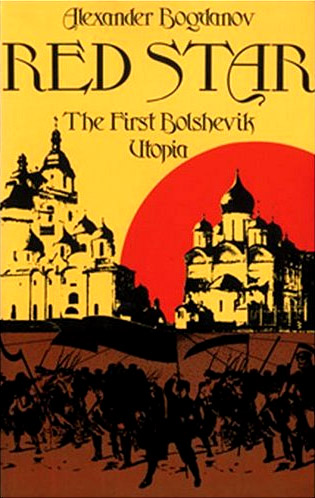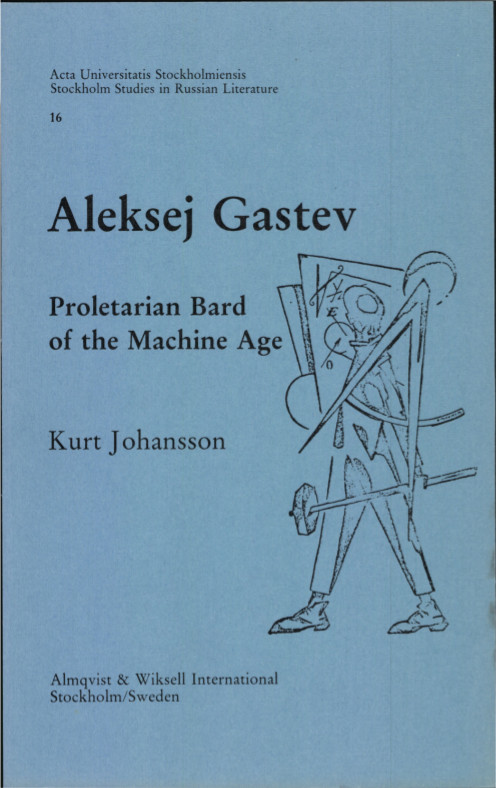Alexander Bogdanov: Red Star: The First Bolshevik Utopia (1908–) [FR, EN, DE]
Filed under fiction | Tags: · communism, marxism, proletariat, science fiction, utopia

A communist society on Mars, the Russian revolution, and class struggle on two planets is the subject of this arresting science fiction novel by Alexander Bogdanov (1873–1928), one of the early organizers and prophets of the Russian Bolshevik party. The red star is Mars, but it is also the dream set to paper of the society that could emerge on earth after the dual victory of the socialist and scientific-technical revolutions. While portraying a harmonious and rational socialist society, Bogdanov sketches out the problems that will face industrialized nations, whether socialist or capitalist.
The book also includes Engineer Menni, a historical novel about the social revolution on Mars, first published in 1913, and the poem A Martian Stranded on Earth, first published as a supplement to the second edition of Red Star in 1924, about a Martian who has reached Earth but is unable to return to his native planet. where mankind has attained a superior level of communist civilization.
Edited by Loren R. Graham and Richard Stites
Translated by Charles Rougle
Publisher Indiana University Press, 1984
ISBN 0253173507, 9780253173508
257 pages
Reviews: Andy Cunningham (Socialist Review), Paul Josephson (Technology and Culture).
L’Étoile rouge (French, 1913-14, HTML, added on 2014-3-27)
Red Star (English, trans. Charles Rougle, 1984)
Der rote Planet (German, undated, HTML, added on 2014-3-27)
See Monoskop wiki for further writings of Bogdanov.
Comments (6)Kurt Johansson: Aleksej Gastev: Proletarian Bard of the Machine Age (1983)
Filed under book | Tags: · 1910s, biography, machine, management, poetry, proletariat, russia, taylorism

This book attempts to give an outline of Aleksej Gastev’s life and works primarily up until 1920.
Aleksej Gastev (1882-1941?) belonged to the Russian proletarian intelligentsia. He was an active revolutionary, a journalist with syndicalist leanings, a metal-worker and trade-union leader, and one of the best proletarian poets. In later years he became perhaps the most important champion of the Taylor system and scientific management in Russia; as the founder and leader of the Institute of Labour (CIT) in Moscow he trained hundreds of thousands of new workers for Soviet industry. In 1938 he fell a victim to the Stalinist terror.
Besides presenting his biography, the present study tries to trace the development of Gastev’s Utopian ideas about the creation of a New Man suited to the industrial society of the future. In his articles and poems the worker is so Intimately fused with machines that he adopts their rhythm and functional movements, himself becoming “mechanical”. One chapter is specially devoted to Gastev’s poetry, the collection Poézija rabočego udara (“The Poetry of the Factory Floor”). Four prose poems are analyzed in detail. These describe the future development of the proletariat, and also show how Gastev ‘s manner of writing gradually becomes a kind of “Taylorized” poetry, that has been strongly influenced by futurism.
Publisher Almqvist & Wiksell International, Stockholm, 1983
Stockholm Studies in Russian Literature series
ISBN 9122006141
170 pages
PDF (updated on 2013-12-8)
Comment (0)Raymond Aron: The Opium of the Intellectuals (1955/1962)
Filed under book | Tags: · critique, history, left, marxism, proletariat, revolution

First published in 1955, this political reflection seeks to show how noble ideas can slide into the “tyranny of secular religion”. It stresses how political thought has the responsibility of telling the truth about social and political reality – in all its imperfections and complexities.
Aron explodes the three “myths” of radical thought: the Left, the Revolution, and the Proletariat. Each of these ideas, Aron shows, are ideological, mystifying rather than illuminating. He also provides a fascinating sociology of intellectual life and a powerful critique of historical determinism in the classically restrained prose for which he is justly famous.
First published in French L’Opium des intellectuels, Paris: Calmann-Lévy, 1955
First published in 1955
Translated by Terence Kilmartin
Foreword translated by Lucile H. Brockway
Publisher W.W. Norton & Company, New York, 1962
324 pages
Review (Rudolf Allers)
Wikipedia (in French)
Comments (2)
